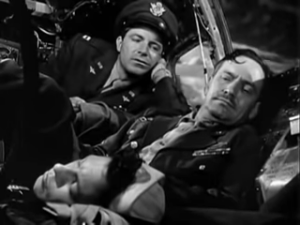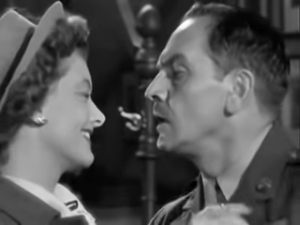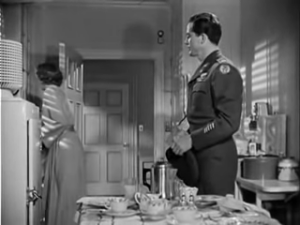Rating: 4.75 out of 5




![]()
My dad fought in the Vietnam War and seen some things. He is okay now, but I heard from several family members that the hardest for him was coming back to civilian life. It is hard to imagine that a person has to fight for their lives and defend a country one way, and then when they come back home, their second war starts. A war that a whole family will have to go through. That war for the soldier and family is readjusting back to civilian life with no one to fight. For some, it can be extremely tough coming back into the civilian world. The skills you had on the battlefield don’t apply to the “real” world. How does one come back to a world that seems to minimize their commitment?

Directed by William Wyler, The Best Years of Our Lives is a film about three United States servicemen readjusting to civilian life after coming home from World War II. The story concentrates on the social re-adjustment of three World War II servicemen, each from a different station of society. Platoon Sergeant Al Stephenson (March) was a banker before going off to war. He comes home to a loving family with his wife Milly (Loy) and children, adult daughter Peggy (Wright), and now teenage son Rob (Hall). He returns to an influential banking position but soon finds it hard to do his job as his loyalty to ex-servicemen outweighs the bank’s goals. Al soon starts to hit that bottle hard to cope with the stress of his career and family. Captain Fred Derry (Andrews) was a soda jerk who married the beautiful Marie (Mayo) shortly before shipping out. Fred soon finds it hard to hold down a job, along with seeing that his marriage is crumbling. Finally, there is Petty Officer 2nd Class Homer Parrish (Russell). Homer lost both of his hands in the war and returns home unsure if his stunning finance, Wilma (O’Donnell), still loves him and still sees him as a worthy man. Soon each must figure out where they truly belong in the new world that they left before the war and come to grips with their own demons.
What makes this movie so intriguing to watch is it is made one year after World War II. We see many films about what it is like to fight in a war, but this is probably one of the first to show what happens when the soldiers come back from war and have to readjust to new life. The movie, for its time, weaves together three people with entirely different outcomes. Each person has their own issues to deal with that many today deal with the unloving marriage, the post-traumatic stress of war, and the loss of a body part. The main theme that should be discussed is how all these men serve their country, but when they come back, they are just another citizen who can’t find work or skills that are not needed, and it is sad to see after fighting so hard.

Fred comes back home to his beautiful wife, who was sleeping around on him while he was gone. She was straight-up trifling. Even though Fred was a captain in the Air Force, homeboy couldn’t find a job and had to take one as a perfume clerk. The interview that he did was sad because all the skills he had didn’t translate over. In the end, homeboy had to divorce his wife because she wanted the finer things in life, but he did find some happiness. Loved how he punched a dude. If he had slapped him, it would’ve been twenty times better.
Al, to me, seemed to have the easier of the three men, but his PTSD was definitely getting to him. Homeboy came back home and hit that bottle and clubs hard. His adjustment was getting back into the lives of his wife and his grown kids. Al’s main problems came from his old job, which became his new job. Homeboy was a banker and then got promoted to vice president of loans. It must be freakin’ nice. Tensions hit between him and his coworkers because homeboy has a heart and gives a loan out to a struggling man who just wants to have a farm. The bank is like, why you did that, its bad for business. When he had that dinner, homeboy went off on a significant tangent while drunk.
Out of everyone, Home had it the worse. I felt bad for Homer, but dude did have a happy ending. Now the story is standard, but homeboy was a star high school athlete. Goes to war and comes back with losing both his arms and now has mechanical hook prostheses. The movie somewhat doesn’t focus on Homer that much, but I think his story was the best of all. I rather see a movie about someone who lost limbs. Homer was cheery through the movie, but when it got to him, he showed he was depressed by shooting a gun in the garage and proclaiming to his girlfriend that he is nothing, and showing how he couldn’t put on a shirt. Yet, homegirl still loved him. I really wanted to see more of his story.
As far as the acting goes, the three main characters did a fantastic job at their roles. Fredric March as Platoon Sergeant Al Stephenson was interesting to watch. Even though his character seemed to be better off than everyone else, PTSD was STRONG within him. He actually had some of the best facial expressions and scenes. That first night when he goes out drinking, he gets DRUNK. He was drunk as a skunk, and the way he looked at his wife when he was dancing with her was priceless. Homeboy forgot what his wife looked like. His award-winning scene came from when he gave that speech at the dinner. Once again, he was drunk, but he was fiery and let everyone know what was on this mind.

Dana Andrews as Captain Fred Derry was the highlight or star of the film, I guess. His arc was interesting, and Andrews did a good job with him, but I was completely uninterested in his character. The second he came home to his really hot wife, I was like, “she is fooling around.” His character did have a hard time adjusting because he went from a bomber to a straight-up perfume man. When you need a job, you need a job.
Harold Russell as Petty Officer 2nd Class Homer Parrish was the one that was overshadowed in the whole film. I wish Harold received more screen time because I felt like his story was by far more interesting. The dude had no arms, and I really wanted to see his adjustment to the world. The film put out the perception he was happy as he had a smile in the bank and then drinking. It wasn’t until the end when you saw some serious issues, but he made it out best by getting married.
I want to give a big shout-out to Director Wyler. For the film’s time when it was released, Wyler tried to present an accurate depiction of the combat veterans and what they will go through when they are reintroduced back in civilian life and how that adjustment period can be one of the most challenging things a former serviceman has to go through.
The Best Years of Our Lives is one of those films that is a classic and has a strong theme. There are plenty of movies that show war, but few show what happens after the war, and servicemen come home and try to readjust to civilian life. All the actors were great and should be applauded for their work. After watching this film go say thank you to a veteran.